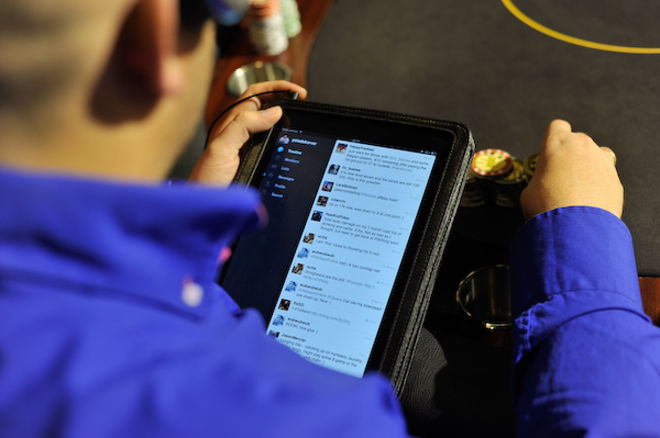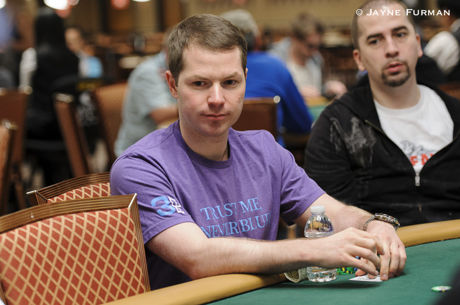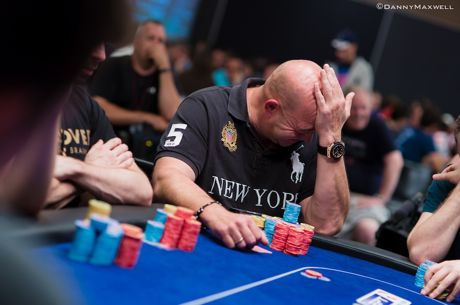How Your Own Poker Style Can Skew Your Reads of Others

If you're on Twitter and use it the way most people do, you probably follow a few hundred people, maybe more. But when you scroll through your timeline, you tend to pay more attention to a certain subset of that group �� maybe just a handful of those you follow �� and skim or ignore the rest.
That is to say, you likely read more carefully tweets sent by people you've come to find more interesting or funny or engaging than others in your timeline, having grown accustomed to slowing down whenever their avatars pop up over there on the left side of your screen.
This happened to me earlier in the week when I lingered a bit over a short exchange on my feed between Andrew Brokos and Nate Meyvis, co-hosts of the Thinking Poker Podcast and occasional contributors here in the Strategy section of PokerNews. If you've read their articles or listened to their podcast, you know they both often have interesting things to say �� about poker and about other things, too.
It was Brokos (@thinkingpoker) who'd started it.
"If you image search 'professional poker players from Louisiana,' one of the first hits is a young man being restrained by security guards," Brokos wrote. I thought briefly about trying to replicate the search myself, but Meyvis beat me to it.
"FWIW this isn't true for me (and Google results are highly individualized)" he replied (from @NateMeyvis). "Interesting," Brokos responded, and the conversation continued a bit more, with both jokingly reflecting on their own search histories.
I also found it interesting, and perhaps because the pair often get me "thinking poker," I couldn't help but relate it to a similar type of highly subjective bias that often occurs at the poker table.
The "Personalized Search" and Narrowing of Experience
If you're not familiar, the Google search engine has a feature called Google Personalized Search. Searches performed on the same browser contribute to something called a "browser cookie record" that is used to filter results from subsequent searches. When you type in a word or phrase, the results that come back are based both on the relevance of the web page and on the websites you've previously visited.
The result is a relatively "personalized search" that is intended to produce more hits that are useful to the individual doing the searching, although one side effect is to bias search results in favor of what the user has already found before. In other words, Google Personalized Search decreases the likelihood of finding new items or information �� perhaps only by a little, depending on both what you're searching for and your previous history on that browser.
In fact, a lot of online sites that involve heavy interaction like Google have introduced similar methods of creating "personalized" experiences via a user's previous history. You've noticed this, no doubt, when visiting (for example) Amazon and seeing all those recommendations based on your previous searches and purchases. Or on Facebook with its many "Custom Audience" targeting features and filters that if chosen can profoundly influence what appears in your feed and on your page.
Even Twitter rolled out an "algorithmic timeline" earlier this year which gives users the option to tic a box and "Show me the best Tweets first" so that "Tweets you are likely to care about most will show up first in your timeline." In other words, it's possible to automate that process of selection I was describing at the start when talking about picking out certain tweets to focus on when scrolling through Twitter, if desired.
One of the more frequently expressed concerns about personalized searches has to do with the way they skew a person's online experience heavily in favor of filtering out anything new or different.
Eli Pariser of MoveOn.org wrote a book about the phenomenon a few years ago titled The Filter Bubble: What the Internet Is Hiding From You. Pariser highlights some of the potentially negative consequences of personalized searches, including the way it creates a safe-seeming "bubble" around users that filters out different views while consistently confirming an individual's own biases.
Playing Hands on the "Filter Bubble"
Setting aside the online world for a moment, how might all of this relate to the way we process information at the poker table? For starters, there we also have certain biases based heavily on previous experience �� both generally speaking, and with particular players.
For example, say you've just begun with no-limit hold'em and for the first several weeks of playing find yourself almost always calling preflop raises when playing from the blinds. Eventually you realize this is often a losing play, and that a lot of the money you're winning when playing hands from later positions you're giving back when stubbornly defending too often from the blinds. At some point you adjust and start being more judicious about which hands you choose to defend against raises from the SB and BB.
You could compare this process to having performed a lot of unhelpful internet searches, then eventually figuring out better keywords to get you closer and closer to more desired results. Unfortunately, the "personalized search" function might have initially caused you to make even more unsuccessful searches early on �� kind of like developing a bad habit in poker (such as playing too many hands from out of position) and finding it hard to work your way out of it. But eventually you discovered a better approach that produced better results.
This tendency can be even more pronounced with regard to your "read" of a certain opponent's style and/or tendencies, including the way we often will take a very small sample size �� even just a hand or two �� and use that information to skew our thinking regarding that player for the next several dozen hands.
A player who is new to the table raises from early position, fires multiple postflop barrels, then shows 6?3? at showdown. For the next several hours others assume he's one of those "any two cards" loose-aggressive maniacs. He wins a few more hands without going to showdown, and each player's "filter bubble" causes everyone to assume he was betting and raising with garbage then, too. But was he?
Perform Better Searches: Don't Read Others' Styles Through Your Own
Such points are easy enough to understand �� indeed, perhaps I've mostly just been confirming your own poker-related biases that you've developed yourself over time. Or whatever you typed in Google that brought you to this article produced a search that was destined to recommend it to you as similar to things you've read before.
Let me add one last point, though, something that against all odds might well be slightly different or new to you.
Most of us understand intuitively how to use our experience at the poker table to improve as players. I'm referring to the trial-and-error we all go through that helps us learn what works and what doesn't. One of the most important stages of that learning process, though, doesn't concern how well we learn to read other players. It has to do with coming to an honest understanding of our own style and tendencies, and recognizing how our own play can affect our understanding of what other players are doing.
We can't know what kind of player we are when first starting out in poker. In fact, it may take many months or longer to realize what our own strategic preferences really are. Then comes the next, crucial step �� figuring out how our own preferences might be distorting our perception of others' play.
If you never permit yourself to open-raise with 6?3? from early position, that is likely going to affect how you perceive another player doing so. The same goes for any other play you notice someone else making that appears to conflict with your own idea of what is "good" or "bad" in a given spot.
Don't automatically "filter" out others' choices as nonsensical or flat-out wrong on the basis that you yourself would never try those plays. You might be right �� it might be a bad play. But try if you can to perform a more thorough, unbiased search of the evidence before leaping to that conclusion.
Conclusion
Many don't realize it, but it's possible to turn off Google Personalized Search. You have to sign out of your Google account, then go to the Search Customization settings page where you can turn the setting off.
It's not so easy to "turn off" the bias created by our own preferred style of play when evaluating others' styles and strategic decisions. But it's worth the effort if you can.
Want to stay atop all the latest in the poker world? If so, make sure to get PokerNews updates on your social media outlets. Follow us on Twitter and find us on both Facebook and Google+!









